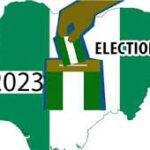By Chesa Chesa
The United States of America says it will impose visa restrictions on anyone who promotes violence as Nigeria holds general elections in 2023.
America’s Deputy Assistant Secretary of State for Africa, Mr. Michael Gonzales, handed out the warning at an international conference with the theme “United States Policy and Nigeria’s National Decisions in the 2023 Elections”, held at Johns Hopkins University, United States.
The conference, which held at the School of Advanced International Studies (SAIS) in Washington DC and virtually, brought together Nigerian and American policy communities to discuss issues around the 2023 general elections.
It was organised by policy research center – Nextier Nigeria, in partnership with SAIS at Johns Hopkins University; the School of International Service at the American University: and the Centre for Peace, Democracy and Development at the University of Massachusetts.
Gonzales said that the United States government “will continue to use our messaging, as well as other diplomatic channels at our disposal, including visa restrictions, where warranted, to dissuade those who might be tempted to use violence to undermine Nigeria’s democratic process.”
He, nonetheless, gave the assurance that the U.S. government remains committed to working with Nigeria to uphold its conventions towards ensuring a peaceful power transition in 2023.
Participants at the conference concluded that weak government performance, mounting economic hardship, and pervasive insecurity could derail Nigeria’s democratic process if the authorities mismanage the 2023 elections.
The conference, moderated by Dr. Ndubuisi Nwokolo, a Partner at Nextier and Honorary Research Fellow, School of Government and Society, University of Birmingham, U.K.), among other global scholars, therefore, stated that Nigeria should maintain existing political conventions that guarantee peace.
Other event moderators at the conference were Dr. Carl LeVan, (Professor, School of International Service, American University and Chair, Comparative and Regional Studies), and Dr. Darren Kew (Professor of Conflict Resolution, University of Massachusetts, Boston and Executive Director of Centre for Peace, Democracy and Development).
Patrick Okigbo III, Nextier’s Founding Partner, clarified that the reason for hosting the conference in the United States was to elevate the election issues and conversations to the international stage.
He reiterated the need for Nigeria’s international partners to assist in upholding her democratic process, even as he pointed out that democracy is not an end state but a project that requires continuous nurturing.
Insecurity in Nigeria and recent occurrences in West Africa and Sahel regions should cause Nigeria’s elite to use the 2023 elections to douse the tensions and set the country on a growth path, he stated.
Okigbo further cautioned that the failure to address the issues raised at the conference could have devastating consequences, whilst attention to the recommendations could yield a bountiful harvest.
Professor Peter Lewis, a Warren Weinstein Chair of African Studies at SAIS, also warned that Nigeria’s weak government performance and pervasive insecurity could lead to a more competitive election in 2023.
Other panelists highlighted the insecurity risks and the need to manage the 2023 elections properly, in addition to other points raised at the conference.
Among these points were the issue of faltering political developments as they concern elitism and Nigeria’s progress, as it was observed that since 1999, the Nigerian elite has found a way to maintain a modicum of stability for elections and “eventually share the dividends of the election outcomes.”
According to Brig. General Saleh Bala (rtd.) “security challenges in Nigeria are true, present and tangible but what is consistent is the lurking shadow of elite interests and how they serve their interests.”
On insecurity threats to Nigeria’s democracy, the conference found that poor management of the elections, especially the rotational presidency convention, could threaten Nigeria’s democracy against the backdrop of pervasive insecurity, the proliferation of small arms and light weapons, rise of self-help groups, and increased secessionist agitations in southern Nigeria.
Director of the Centre for Democracy and Development, Ms. Idayat Hassan, noted that ‘political parties during the Anambra State governorship election cycle could not campaign due to insecurity’, and that worse scenarios could happen in 2023.
The rest of the major issues were discussed and concluded thus: Poverty Dilemma: The deteriorating social conditions will affect the 2023 elections. It could cause the electorate to become more engaged and demand better governance, or it could make them remain uninterested and disenfranchised, further widening the inequality gap.
The deepening poverty levels mean that most Nigerians cannot protest or focus on civic activities for more than a few days before returning to their quest for economic survival. Patrick Okigbo posited that “an average Nigerian focuses on making their daily bread and does not have the luxury of focusing on civic action”.



